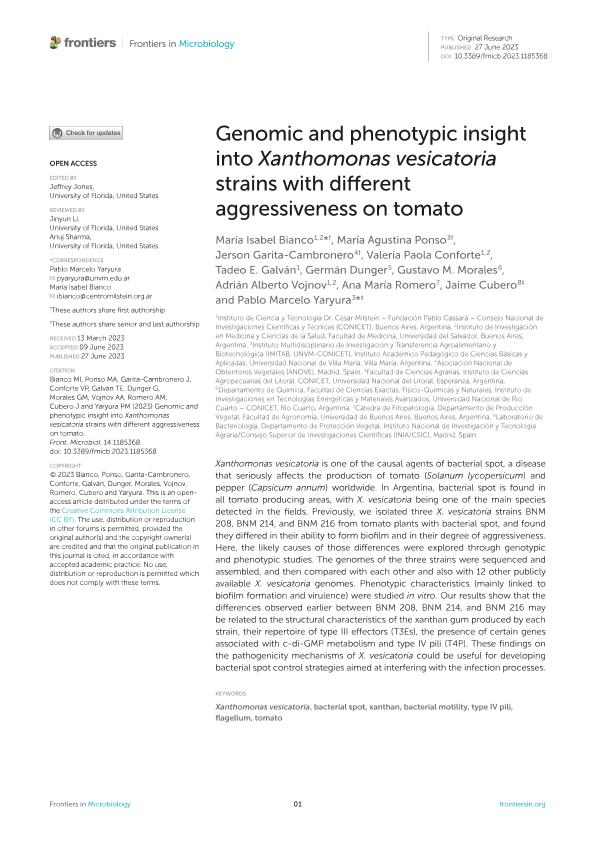Artículo
Genomic and phenotypic insight into Xanthomonas vesicatoria strains with different aggressiveness on tomato
Bianco, María Isabel ; Ponso, María Agustina
; Ponso, María Agustina ; Garita Cambronero, Jerson; Conforte, Valeria Paola
; Garita Cambronero, Jerson; Conforte, Valeria Paola ; Galván, Tadeo E.; Dunger, Germán; Morales, Gustavo Marcelo
; Galván, Tadeo E.; Dunger, Germán; Morales, Gustavo Marcelo ; Vojnov, Adrián Alberto
; Vojnov, Adrián Alberto ; Romero, Ana María; Cubero, Jaime; Yaryura, Pablo Marcelo
; Romero, Ana María; Cubero, Jaime; Yaryura, Pablo Marcelo
 ; Ponso, María Agustina
; Ponso, María Agustina ; Garita Cambronero, Jerson; Conforte, Valeria Paola
; Garita Cambronero, Jerson; Conforte, Valeria Paola ; Galván, Tadeo E.; Dunger, Germán; Morales, Gustavo Marcelo
; Galván, Tadeo E.; Dunger, Germán; Morales, Gustavo Marcelo ; Vojnov, Adrián Alberto
; Vojnov, Adrián Alberto ; Romero, Ana María; Cubero, Jaime; Yaryura, Pablo Marcelo
; Romero, Ana María; Cubero, Jaime; Yaryura, Pablo Marcelo
Fecha de publicación:
06/2023
Editorial:
Frontiers Media
Revista:
Frontiers in Microbiology
e-ISSN:
1664-302X
Idioma:
Inglés
Tipo de recurso:
Artículo publicado
Clasificación temática:
Resumen
Xanthomonas vesicatoria is one of the causal agents of bacterial spot, a disease that seriously affects the production of tomato (Solanum lycopersicum) and pepper (Capsicum annum) worldwide. In Argentina, bacterial spot is found in all tomato producing areas, with X. vesicatoria being one of the main species detected in the fields. Previously, we isolated three X. vesicatoria strains BNM 208, BNM 214, and BNM 216 from tomato plants with bacterial spot, and found they differed in their ability to form biofilm and in their degree of aggressiveness. Here, the likely causes of those differences were explored through genotypic and phenotypic studies. The genomes of the three strains were sequenced and assembled, and then compared with each other and also with 12 other publicly available X. vesicatoria genomes. Phenotypic characteristics (mainly linked to biofilm formation and virulence) were studied in vitro. Our results show that the differences observed earlier between BNM 208, BNM 214, and BNM 216 may be related to the structural characteristics of the xanthan gum produced by each strain, their repertoire of type III effectors (T3Es), the presence of certain genes associated with c-di-GMP metabolism and type IV pili (T4P). These findings on the pathogenicity mechanisms of X. vesicatoria could be useful for developing bacterial spot control strategies aimed at interfering with the infection processes.
Archivos asociados
Licencia
Identificadores
Colecciones
Articulos (IMITAB)
Articulos de INSTITUTO MULTIDISCIPLINARIO DE INVESTIGACIÓN Y TRANSFERENCIA AGROALIMENTARIA Y BIOTECNOLÓGICA
Articulos de INSTITUTO MULTIDISCIPLINARIO DE INVESTIGACIÓN Y TRANSFERENCIA AGROALIMENTARIA Y BIOTECNOLÓGICA
Citación
Bianco, María Isabel; Ponso, María Agustina; Garita Cambronero, Jerson; Conforte, Valeria Paola; Galván, Tadeo E.; et al.; Genomic and phenotypic insight into Xanthomonas vesicatoria strains with different aggressiveness on tomato; Frontiers Media; Frontiers in Microbiology; 14; 6-2023; 1-17
Compartir
Altmétricas



